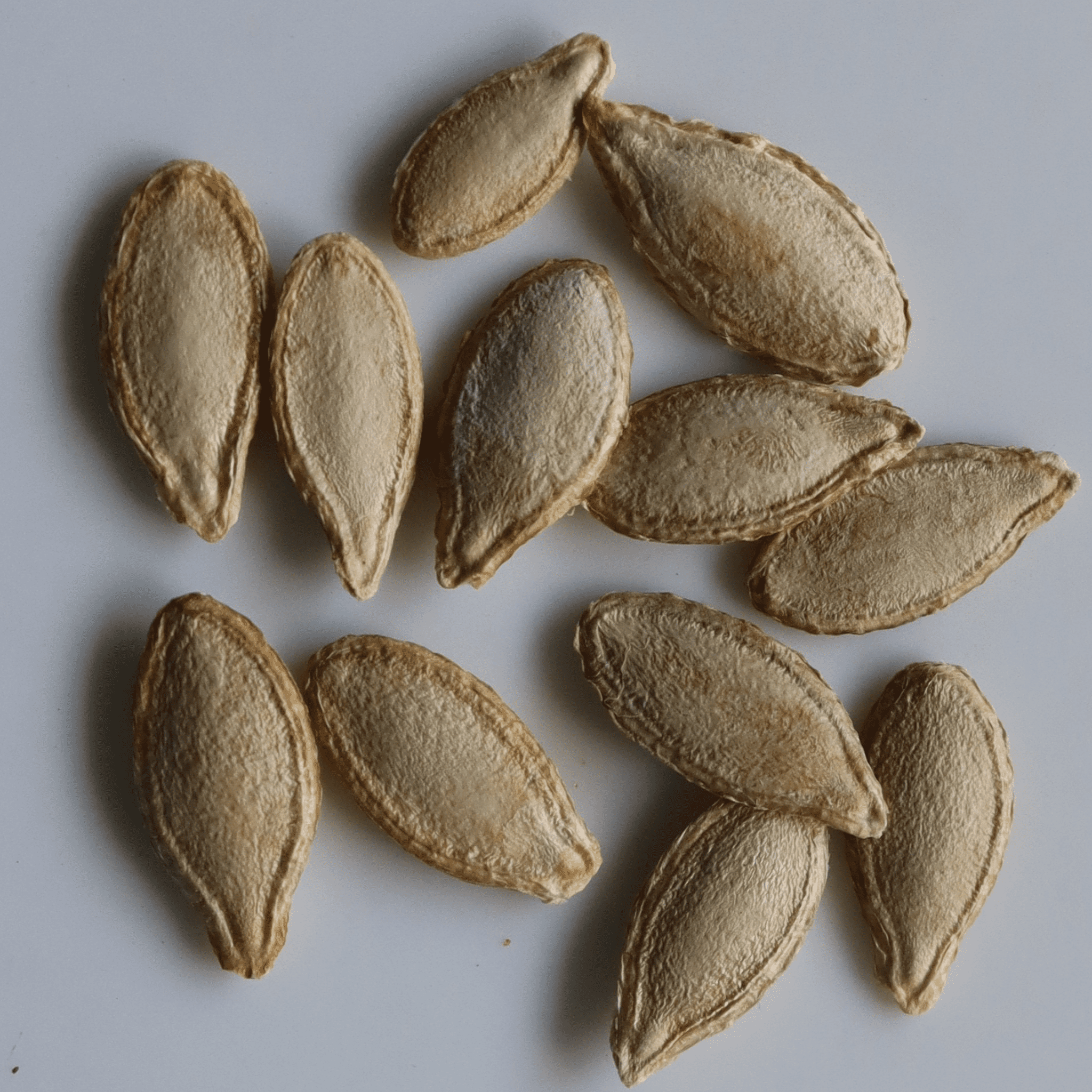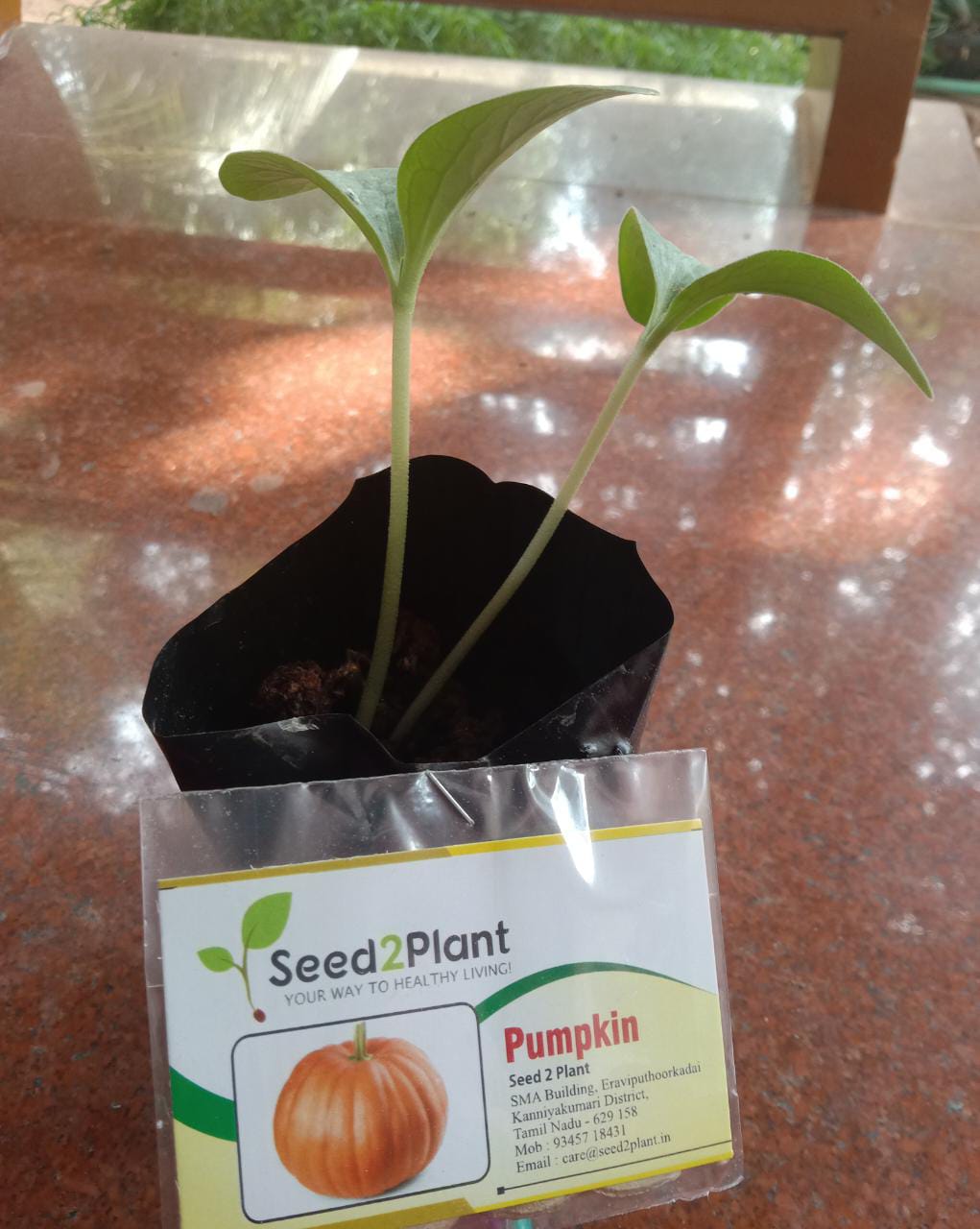


Product Description - Organic Pumpkin Seeds - Open Pollinated
Pumpkins are an annual herbaceous plant with a pentagonal stem and no thorns. Cordiform pentagonal leaves with white spots inside the nerves. The corolla is composed of numerous lobes, a lanceolate shape, and a yellow color. Female flowers have lobed sepals. When fully ripe, the pepo fruit, round or ellipsoidal, even or bulky, is coated in a white powder. The skin is crimson, yellowish, orange and features wriggling, reticular, wavy, or striped mottling. The peduncle, which is pentagonal, connects the fruit to the stem and is a well-developed part of the stem's base. Since it is indigenous to warm countries, it enjoys warm temperatures and is easily adapted.
Benefits/Uses of Pumpkin
- Prevents Diabetes Complications
- Aids in the treatment of an Overactive Bladder
- Enhances eye health
- Addresses Fertility Issues
Specifications of Pumpkin Seeds
|
Common Name |
Pumpkin |
|
Sunlight |
Full Sunlight |
|
Water |
one inch per week |
|
Temperature |
24-27 degree celsius |
|
Soil |
Well-drained soil |
|
Fertilizer |
More potassium is required |
|
Germination |
5 to 10 days |
|
Harvest Season |
Jan to Mar & Sep to Dec |
|
No. of seeds |
12 |
Planting and Care for Pumpkin
Sowing Pumpkin Seeds
- Pumpkins thrive when seeds are directly planted in big grow bags.
- Wait until the soil temperature reaches 70oF or higher before sowing seeds outdoors.
- 95 degrees F is the optimal soil temperature.
- Pumpkins are very cold-sensitive. Seed indoors in peat pots around 2 to 4 weeks before the last spring frost if your growing season is abridged. Be sure to harden off entirely before transplanting.
- Place the Pumpkin grow bags at the full sun to light shade and ample space for sprawling vines.
- Plant pumpkins along the terrace garden's perimeter and guide vine growth to the lawn or sidewalk.
- The vines would be an annoyance for just a few weeks.
- Pumpkins are big, voracious feeders.
- They prefer extremely fertile soil that is well-drained and not too wet.
- Before you sow seeds or transplant, amend the planting site with plenty of compost, vegetable and fruit mix, and aged manure.
- With the proper soil temperature (70 degrees F), plants can germinate less than a week and emerge in 5 to 10 days.
Growing Pumpkin
- Row covers can be used to shield plants early in the season and to ward off insects.
- However, remove covers before flowering if you allow for insect pollination.
- Pumpkins are extremely thirsty plants that need plenty of water.
- Water at one-inch height per week.
- Deep watering is essential during the fruit set.
- When watering, avoid wetting leaves or fruit unless it is a sunny day.
- Dampness increases the likelihood of rot and other diseases.
- Mulch the area around your pumpkins to conserve moisture, kill weeds, and deter pests.
- Bear in mind that pumpkins are extremely delicate from planting to harvest.
- Mulch is an excellent way to control weeds.
- Avoid over-cultivating, as this can cause damage to their extremely shallow roots.
- It's natural if your first flowers do not bear fruit. Male and female blossoms also need opening. Maintain patience.
- Since bees are essential for pollination, exercise caution when using insecticides to control pests.
- Though obstinate, pumpkin vines are highly delicate. Take care not to injure vines, as this may degrade the fruit's quality.
Harvesting Pumpkin
- Pumpkins should be harvested when they are fully mature.
- Avoid picking pumpkins off the vine until they reach the desired size.
- When a pumpkin's skin turns a rich, strong color, it is ripe.
- When thumping the Pumpkin with your finger, the rind can feel hard and make a hollow sound.
- Punctuate the pumpkin skin with your nail; if it resists, it is ripe.
- Pumpkins and winter squashes should be harvested on a dry day after the plants have died back and the skins have become rough.
- When picking pumpkins and winter squash, leave an inch or two of stem on them to prevent decay.
- To pick the Pumpkin, carefully cut the fruit from the vine with a sharp knife or pruners; avoid tearing. Avoid cutting too close to the Pumpkin; a generous amount of stem will extend the Pumpkin's shelf life.
- Handle pumpkins carefully to avoid bruising them.
Precautions while growing Pumpkin
- Growing pumpkins need little maintenance.
- The trick is to keep them well-watered and not to allow them to dry out.
- Apart from ensuring the fruits receive adequate light, there will be little other maintenance needed.
- If the leaves begin to obscure the fruits, reposition or trim the leaves to allow sunlight to reach the fruit.
- It takes approximately four months for your Pumpkins to reach full maturity.
Common Problems affecting Pumpkin plants and solutions
Foliar diseases often afflict pumpkin crops. The most common foliar diseases are powdery mildew, downy mildew, white speck (Plectosporium), gummy stem blight, and anthracnose. Mildew powdery Powdery mildew appears just as it sounds. Powdery mildew, which is initially visible on the lower leaf surface, is a white "powdery" coating of spores that spreads from the lower to the upper leaf surface, gradually defoliating the pumpkin plants. Spores persist in soil and crop residue, where they are dispersed by wind. It is one of the most easily identifiable diseases, and unlike other foliar diseases, it appears to become more severe during periods of dry weather. To combat powdery mildew, rotate your crops with non-cucurbit crops and treat them immediately with fungicide.
Numerous insects consider pumpkins to be a favorite food source, and pests on pumpkins can be a real problem. However, the majority are treatable or at the very least preventable. To prevent pests and insects, it is strongly recommended to use bio pest protection, bio pest control for sucking pests, and bio pest control for biting pests. The following are the most common bugs found on pumpkin plants, along with instructions on how to handle them:
Termites – Beetles are the most common pest on pumpkins, but they are easily controlled. Spray a mild pesticide on your vines, and they should vanish.
Snails and slugs – Snails and slugs are especially fond of the tender flesh of very young giant pumpkins. Wrap your Pumpkin in a ring of Epsom salt or sand – the pumpkin insect pests will avoid it. If the skin of your Pumpkin has hardened, they will be unable to puncture it and will cease to be a concern.
Squash bugs – Squash bugs will wreak havoc on stems and leaves, necessitating effective pumpkin insect control with an insecticide.
Vine borers – Vine borers can cause serious pumpkin insect problems. These animals burrow deeply into pumpkin vines, sucking the moisture from them. If you come across one, you might be able to save your vine by digging the bug out and burying the damaged portion of the vine in the ground to promote root growth. However, this is a risky endeavor that is not always fruitful. Preventative steps such as treating the whole vine with a powerful pesticide are the safest course of action.
Aphids – Aphids are a pest on pumpkins that do little harm until they are in large numbers, at which point they yellow the leaves and develop a disgusting, sticky substance called honeydew. They may, however, spread disease among pumpkin plants even in small numbers. While light insecticides can eradicate an aphid infestation, they can also be controlled with a strong water spray, the introduction of natural predators such as ladybugs, and the use of reflective mulch.
No. of Pumpkin Seeds - 12





